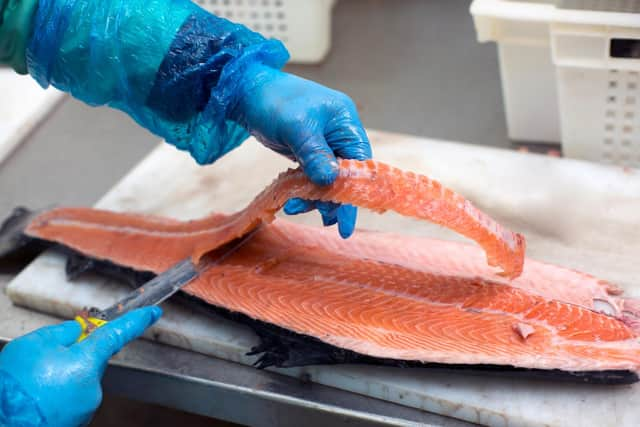Scottish scientists begin novel experiment that could turn fish guts into green nylon for clothing
Plastic experts from Impact Solutions, biotechnology researchers from the University of Edinburgh, seafood producer Farne Salmon and the Industrial Biotechnology Innovation Centre (IBioIC) are using advanced molecular biology techniques to explore the feasibility of creating more eco-friendly man-made fibres for use in clothing and other everyday products.
The group is taking waste material generated as part of fish processing and using biological enzymes to extract the fatty components of the waste matter.
Advertisement
Hide AdAdvertisement
Hide AdIn what is thought to be a world first, they are harnessing genetically modified bacteria to turn these parts into a mixture of adipic acid, a key ingredient used to make nylon, and other useful by-products.


Simon Rathbone, development manager at Impact Solutions, said: “The project marks the start of an exciting journey to find a sustainable alternative for a key component found in the fabric of our clothes.
“The initial feasibility study has led us to an exciting juncture where we can begin to see the potential of generating value from a material that would otherwise be discarded.
“As well as adipic acid, we want to maximise the overall value of the process by looking at other components that can be extracted from the fish waste, such as fatty acids and fish oils.
“Collaboration has played a huge part in getting to where we are so far, showcasing what can be achieved when industry and academic partners get together and combine expertise.”
Liz Fletcher, director of business engagement at IBioIC, said: “Exploring sustainable bio-based alternatives to petrochemical-based processes is an important step in Scotland’s efforts to reach net zero, and there is a huge opportunity to make more use of co-products and extract value from industrial waste as part of that.”
As much as 492,000 tonnes of waste is created annually by the UK’s fish processing industry – comprising fish remains, oils and wastewater collected during the clean-down of processing plants.
Currently, the waste must go through either expensive and energy-intensive treatment and separation or can be used in low-value products such as animal feed or fertiliser.
Advertisement
Hide AdAdvertisement
Hide AdThis novel process could uncover alternative uses for the waste material.
Angus Forbes, environment and projects manager at Labeyrie Fine Foods, said: “Our mission is to be a more sustainable business, managing all aspects and impacts of our daily activities and in particular utilising in full the scarce resources we impact upon on a daily basis.
“Our waste streams have been a major focus in recent years and wherever possible we have found routes to divert them to businesses who have the foresight and technology to utilise them as a raw material for further processing.”
In addition to nylon, adipic acid is used in a range of products, including polyurethane-based items such as building insulation and furniture cushioning, as well as cosmetics, lubricants, pharmaceuticals and food additives and flavourings.
The researchers say the study is an important first step towards finding a sustainable, bio-based alternative for production of adipic acid, which is typically derived from petrochemicals.
The current process is known to have a significant impact on the environment.
Waste nitrous oxide is one of many by-products of the process, with some reports stating that it could be more harmful to the climate than carbon dioxide.
A message from the Editor:
Thank you for reading this article. We’re more reliant on your support than ever as the shift in consumer habits brought about by coronavirus impacts our advertisers.
If you haven’t already, please consider supporting our trusted, fact-checked journalism by taking out a digital subscription.
Comments
Want to join the conversation? Please or to comment on this article.
